郭著章《英汉互译实用教程》(第4版)教材配套题库-第5章 翻译常用的八种技巧(中)【圣才出品】
- 格式:pdf
- 大小:1016.52 KB
- 文档页数:53
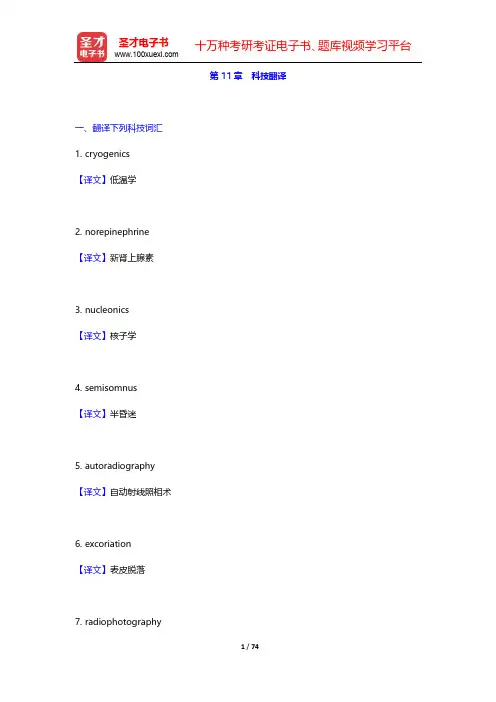
第11章科技翻译一、翻译下列科技词汇1. cryogenics【译文】低温学2. norepinephrine【译文】新肾上腺素3. nucleonics【译文】核子学4. semisomnus【译文】半昏迷5. autoradiography【译文】自动射线照相术6. excoriation【译文】表皮脱落7. radiophotography【译文】无线电传真8. anti-armored fighting vehicle missile【译文】反装甲车导弹9. cpd【译文】compound化合物10. FM【译文】frequency modulation调频11. telesat【译文】telecommunications satellite通讯卫星12. frame【译文】(机械)机架;(计算机技术)“帧”或“镜头”13. normal【译文】<化学>中性的;当量的;标准浓度<物理学>简正的<几>垂直的;法线的;法线<生物学>不受感染的14. AIDS【译文】获得性免疫缺乏综合症15. poliomyelitis【译文】脊髓灰质炎16. conjunctivitis【译文】结膜炎17. diarrhea【译文】腹泻18. pink eye【译文】红眼病19. the runs【译文】拉肚子20. heartman【译文】换心人21. fallout【译文】放射性尘埃22. photobotany【译文】光植物学23. salt former【译文】卤素24. hot press【译文】热压25. waterproof【译文】防水的26. heart burn【译文】胃灼热/心口灼热27. antiparticle【译文】反粒子28. antineutron【译文】反中子29. antibody【译文】抗体30. autocorrelation【译文】自相关31. semicorrelator【译文】自相关器【解析】科技词汇中有许多以verb+er/or构成的词指的是某一仪器而不是人。
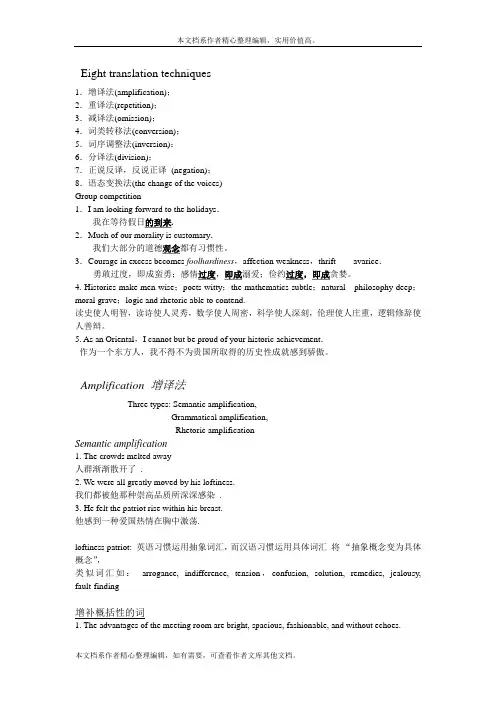
Eight translation techniques1.增译法(amplification);2.重译法(repetition);3.减译法(omission);4.词类转移法(conversion);5.词序调整法(inversion):6.分译法(division);7.正说反译,反说正译(negation);8.语态变换法(the change of the voices)Group competition1.I am looking forward to the holidays.我在等待假日的到来.2.Much of our morality is customary.我们大部分的道德观念都有习惯性。
3.Courage in excess becomes foolhardiness,affection weakness,thrift avarice.勇敢过度,即成蛮勇;感情过度,即成溺爱;俭约过度,即成贪婪。
4. Histories make men wise;poets witty;the mathematics subtle;natural philosophy deep;moral grave;logic and rhetoric able to contend.读史使人明智,读诗使人灵秀,数学使人周密,科学使人深刻,伦理使人庄重,逻辑修辞使人善辩。
5. As an Oriental,I cannot but be proud of your historic achievement.作为一个东方人,我不得不为贵国所取得的历史性成就感到骄傲。
Amplification 增译法Three types: Semantic amplification,Grammatical amplification,Rhetoric amplificationSemantic amplification1. The crowds melted away人群渐渐散开了.2. We were all greatly moved by his loftiness.我们都被他那种崇高品质所深深感染.3. He felt the patriot rise within his breast.他感到一种爱国热情在胸中激荡.loftiness patriot: 英语习惯运用抽象词汇,而汉语习惯运用具体词汇将“抽象概念变为具体概念”,类似词汇如:arrogance, indifference, tension,confusion, solution, remedies, jealousy, fault-finding增补概括性的词1. The advantages of the meeting room are bright, spacious, fashionable, and without echoes.这个会议室有四大优点:明亮、宽敞、时髦、无回声。
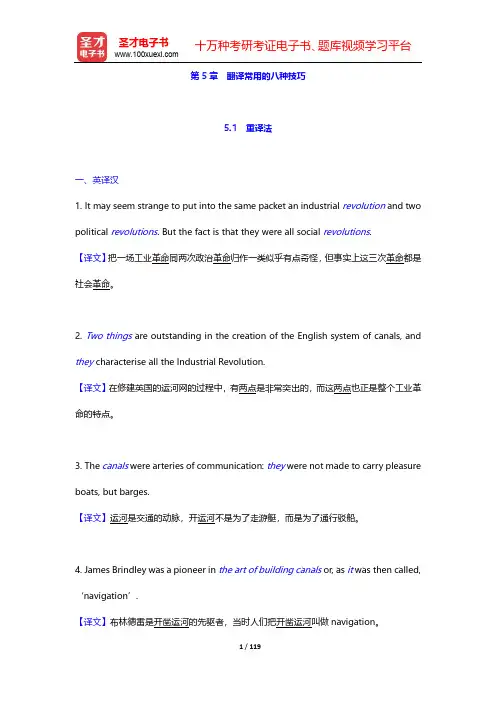
第5章翻译常用的八种技巧5.1 重译法一、英译汉1. It may seem strange to put into the same packet an industrial revolution and two political revolutions. But the fact is that they were all social revolutions.【译文】把一场工业革命同两次政治革命归作一类似乎有点奇怪,但事实上这三次革命都是社会革命。
2. Two things are outstanding in the creation of the English system of canals, and they characterise all the Industrial Revolution.【译文】在修建英国的运河网的过程中,有两点是非常突出的,而这两点也正是整个工业革命的特点。
3. The canals were arteries of communication: they were not made to carry pleasure boats, but barges.【译文】运河是交通的动脉,开运河不是为了走游艇,而是为了通行驳船。
4. James Brindley was a pioneer in the art of building canals or, as it was then called, ‘navigation’.【译文】布林德雷是开凿运河的先驱者,当时人们把开凿运河叫做navigation。
5. Several factors accounted for this extraordinary achievement. One was the expansion into the west. Another was the application of machinery to farming. 【译文】取得这一特殊成就有几方面的原因:第一个原因是向西部的扩展,第二个原因是机器在农业上的应用。
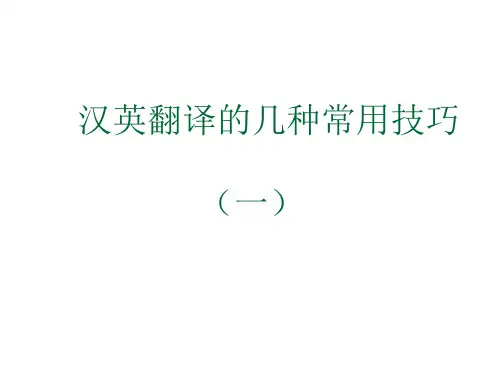

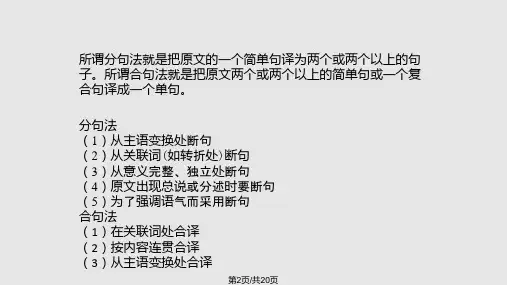
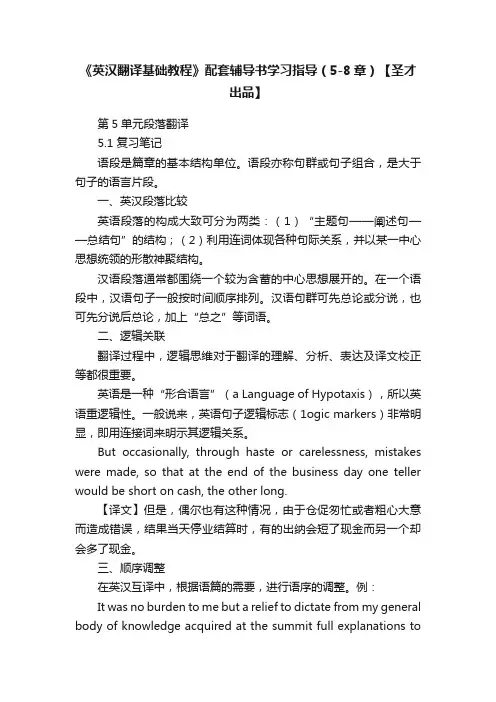
《英汉翻译基础教程》配套辅导书学习指导(5-8章)【圣才出品】第5单元段落翻译5.1 复习笔记语段是篇章的基本结构单位。
语段亦称句群或句子组合,是大于句子的语言片段。
一、英汉段落比较英语段落的构成大致可分为两类:(1)“主题句——阐述句——总结句”的结构;(2)利用连词体现各种句际关系,并以某一中心思想统领的形散神聚结构。
汉语段落通常都围绕一个较为含蓄的中心思想展开的。
在一个语段中,汉语句子一般按时间顺序排列。
汉语句群可先总论或分说,也可先分说后总论,加上“总之”等词语。
二、逻辑关联翻译过程中,逻辑思维对于翻译的理解、分析、表达及译文校正等都很重要。
英语是一种“形合语言”(a Language of Hypotaxis),所以英语重逻辑性。
一般说来,英语句子逻辑标志(1ogic markers)非常明显,即用连接词来明示其逻辑关系。
But occasionally, through haste or carelessness, mistakes were made, so that at the end of the business day one teller would be short on cash, the other long.【译文】但是,偶尔也有这种情况,由于仓促匆忙或者粗心大意而造成错误,结果当天停业结算时,有的出纳会短了现金而另一个却会多了现金。
三、顺序调整在英汉互译中,根据语篇的需要,进行语序的调整。
例:It was no burden to me but a relief to dictate from my general body of knowledge acquired at the summit full explanations toone I know so well.【译文】根据我在峰会所获得的全部知识来对我所深知的人作全面说明,这并不是一种负担,而是使我如释重负。
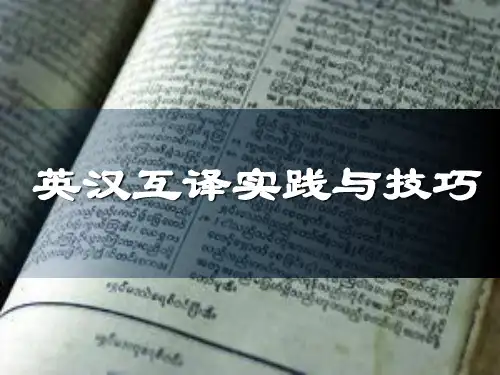
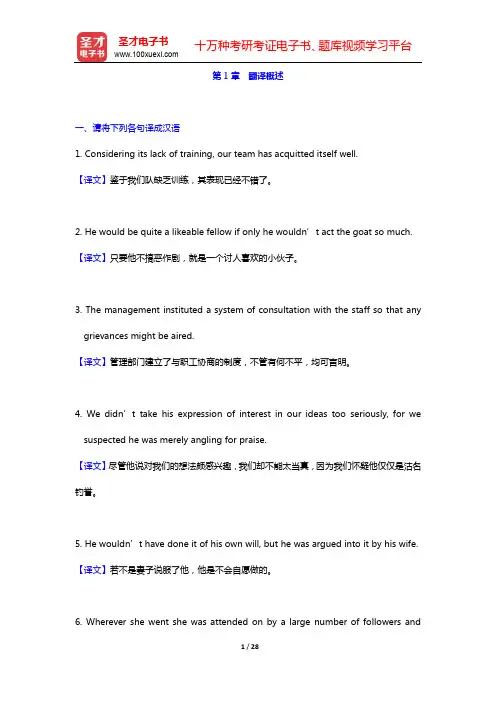
第1章翻译概述一、请将下列各句译成汉语1. Considering its lack of training, our team has acquitted itself well.【译文】鉴于我们队缺乏训练,其表现已经不错了。
2. He would be quite a likeable fellow if only he wouldn’t act the goat so much. 【译文】只要他不搞恶作剧,就是一个讨人喜欢的小伙子。
3. The management instituted a system of consultation with the staff so that any grievances might be aired.【译文】管理部门建立了与职工协商的制度,不管有何不平,均可言明。
4. We didn’t take his expression of interest in our ideas too seriously, for we suspected he was merely angling for praise.【译文】尽管他说对我们的想法颇感兴趣,我们却不能太当真,因为我们怀疑他仅仅是沽名钓誉。
5. He wouldn’t have done it of his own will, but he was argued into it by his wife. 【译文】若不是妻子说服了他,他是不会自愿做的。
6. Wherever she went she was attended on by a large number of followers andservants.【译文】不管她走到哪里,随从和佣人都是前呼后拥。
7. You never realize how fortunate you are to have good health until it is suddenly brought home to you by the sight of suffering.【译文】除非你突然亲眼目睹体弱多病之苦,不然,你不会认识到有一个健康的身体是何等有幸。
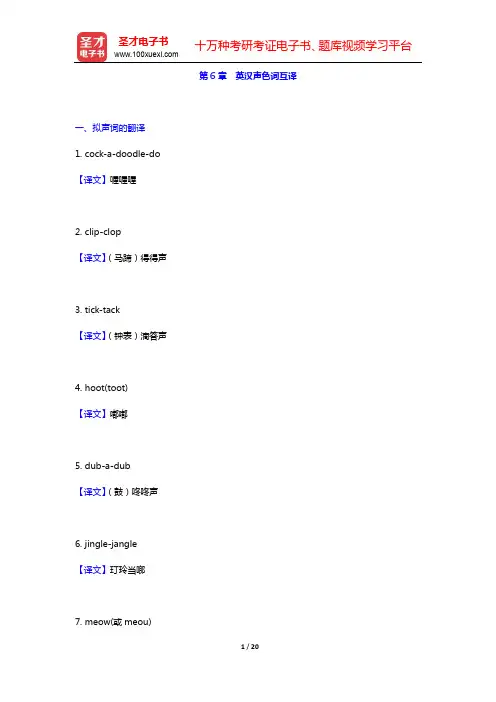
第6章英汉声色词互译一、拟声词的翻译1. cock-a-doodle-do【译文】喔喔喔2. clip-clop【译文】(马蹄)得得声3. tick-tack【译文】(钟表)滴答声4. hoot(toot)【译文】嘟嘟5. dub-a-dub【译文】(鼓)咚咚声6. jingle-jangle【译文】玎玲当啷7. meow(或meou)【译文】喵8. hiss【译文】嘶嘶(作声)9. dingdong【译文】叮咚(声),叮当(声)10. ping【译文】乒11. giggle【译文】咯咯(地笑)12. pit-a-pat【译文】劈劈啪啪(地)13. cuckoo【译文】咕咕14. babble【译文】(婴儿)咿呀学语声;(流水)潺潺作声15. smack【译文】(拍击声、鞭打声、砸嘴声、掌掴声)16. 萧萧【译文】(a horse) neighs, (the rain) patters, (the wind) whistles, (the trees) rustle17. 鸣【译文】(birds) chirp, (frogs) creak, (a bugle) honks18. 皮鞋声【译文】the clicker-clack of the leather shoes19. 锣声【译文】the clangor of the gong20. 表的响声【译文】the tick-tack of the watch21. 雷声【译文】the rumbling (rolling) of the thunder22. 收音机的声音【译文】the squeaking of the radio23. 公共汽车声【译文】the thumping of the bus24. 麻将声【译文】the clatter of mahjong25. 门铃声【译文】the jingle of the door bell26. A horse neighs/whinnies/nickers.【译文】马嘶/马鸣/马萧萧。
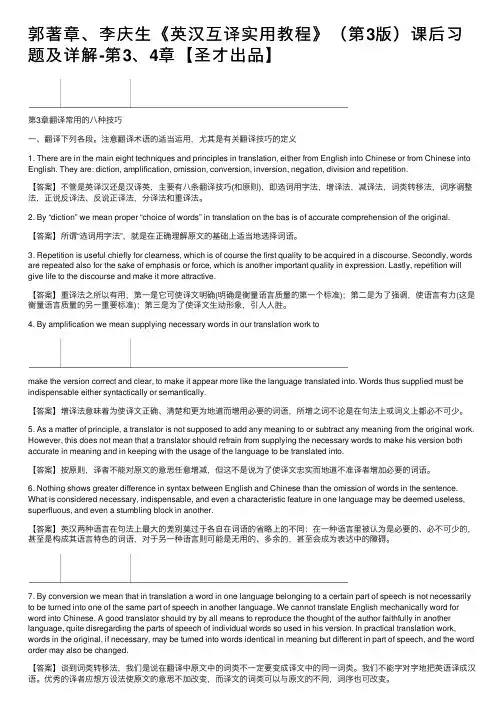
郭著章、李庆⽣《英汉互译实⽤教程》(第3版)课后习题及详解-第3、4章【圣才出品】第3章翻译常⽤的⼋种技巧⼀、翻译下列各段。
注意翻译术语的适当运⽤,尤其是有关翻译技巧的定义1. There are in the main eight techniques and principles in translation, either from English into Chinese or from Chinese into English. They are: diction, amplification, omission, conversion, inversion, negation, division and repetition.【答案】不管是英译汉还是汉译英,主要有⼋条翻译技巧(和原则),即选词⽤字法,增译法,减译法,词类转移法,词序调整法,正说反译法、反说正译法,分译法和重译法。
2. By “diction” we mean proper “choice of words” in translation on the bas is of accurate comprehension of the original.【答案】所谓“选词⽤字法”,就是在正确理解原⽂的基础上适当地选择词语。
3. Repetition is useful chiefly for clearness, which is of course the first quality to be acquired in a discourse. Secondly, words are repeated also for the sake of emphasis or force, which is another important quality in expression. Lastly, repetition will give life to the discourse and make it more attractive.【答案】重译法之所以有⽤,第⼀是它可使译⽂明确(明确是衡量语⾔质量的第⼀个标准);第⼆是为了强调,使语⾔有⼒(这是衡量语⾔质量的另⼀重要标准);第三是为了使译⽂⽣动形象,引⼈⼈胜。
第8章Idioms与熟语的翻译一、谚语和成语翻译1. Barking dogs do not bite.【译文】吠犬不咬人。
2. Who is contented, enjoys.【译文】知足者常乐。
3. Misfortunes never come singly.【译文】祸不单行4. It is harder to change human nature than to change rivers and mountains. 【译文】江山难改,本性难移。
5. Like father, like son.【译文】有其父必有其子。
6. as light as a feather(or as thistle-down)【译文】轻如鸿毛7. to take a load off one’s mind【译文】如释重负8. to run in the same groove; to cut from the same cloth 【译文】如出一辙9. to make a beast of oneself【译文】形同禽兽10. He that hath been bitten by a serpent is afraid of a rope. 【译文】一朝被蛇咬,十年怕草绳。
11. Shallow streams make most din.【译文】水深不响,水响不深。
12. Money makes the mare go.【译文】有钱能使鬼推磨。
13. Reckless youth makes rueful age.【译文】少壮不努力,老大徒伤悲。
14. A word spoken is past recalling.【译文】一言既出,驷马难追。
15. Great boast, small roast.【译文】干打雷,不下雨。
16. T ake not a musket to kill a butterfly.【译文】杀鸡焉用宰牛刀。
⼀、勿“从⼀⽽终” 汉语⾔简意赅,句⼦灵活,往往是⼀个汉语词汇对应N个英语(论坛)词汇,具体到在本句中应该采⽤哪个意项,务必抓住精神实质,不可以不变应万变。
⾄于怎么应变,这就是显⽰译者功⼒的地⽅了。
⽐如:都是“问题”,下⾯的翻译各不相同。
共同关⼼的问题questions of common interest 解决问题solve a problem 问题的关键the heart of the matter 关键问题a key problem 原则问题a question/matter of principle 没有什么问题without any mishap 摩托车有点问题Something is wrong with the motorcycle. 问题不在这⾥That is not the point. 译者要掌握这种汉英翻译中的“游击战术”,翻译家应是不同“⽂化王国”边境线上的“游击战略家”。
沙博⾥将《⽔浒传》译为:Outlaws of the Marsh(沼泽地上的亡命之徒),杨宪益译将屈原的《国殇》译为:For Those Fallen for Their Country,北外出版社将《儒林外史》译为:The Scholars。
这些都是译者吃透了原⽂的原意⽽译出的佳作。
⼆、勿望⽂⽣义,机械直译 这多半是初学者犯的⽑病,他们易于被表⾯现象所迷惑。
黄⽜(yellow cow——ox前误后正,下同) 黄鹂(yellow bird ——oriole) 黄⽠( yellow melon——cucumber) 紫菜(purple vegetable ——laver) 红⽊(red wood——padauk) 红⾖杉(red fir——Chinese yew) ⿊社会(black society ——sinistergang) 三、忌“⽔⼟不符”,习惯搭配失当 这的确是难度系数较⼤的问题,它要求译者既有较⾼的中⽂修养,⼜要有较⾼的英⽂造诣,⼀知半解的⼈常常在此“翻车”。
附录翻译练笔材料及详解一、英文短篇1A faint whinny, penetrating her dreams, woke the little girl on the veranda①. When she opened her eyes it was still not quite light and the tall gums crowding the steep rise to the road loomed up darkly over the house②, only leaving a pale strip of sky. Dew lay heavy on everything -the bark woodshed, the wheelbarrow by the stump, the bracken on the edge of the bush.③From the spouting trickled beads of water, dimming the flywire that netted the veranda.Warm in her blankets, the little girl looked drowsily up at the dark shape that always frightened her at bedtime; it had the beard and hunched shoulders of an old man and stretched out a dead hand④. Now, in the growing light, it was only a tree, no different from the other trees. Noises were beginning to seep through the woolly mist—the yellow robin’s plucked string⑤, clop-clop and jingle of a farmer’s cart on the road above, snort of the pony that was always brought into the paddock near the house at night-time.【参考译文】一阵轻微的马嘶声闯进了睡在阳台上的小妞的梦乡,把她惊醒了①。
郭著章《英汉互译实用教程》(第4版)教材配套题库-第5章翻译常用的八种技巧(中)【圣才出品】5.3 减译法1. I know my friends from the feel of their faces.【译文】我靠触摸脸庞来辨认朋友。
2. Ice is a solid. If we heat it, it melts and becomes water.【译文】冰是固体,如果加热,就融化成水。
3. John got up very early in the morning. He put on his jacket, sat down at his desk and began to do his homework.【译文】约翰早晨起床很早,他穿上夹克,就坐在桌旁开始做家庭作业。
4. But at the present moment the whole road looked rather pretty, for the sun had just set in splendor, and the equalities of rent were drowned in a saffron afterglow. 【译文】但此时整条路看起来都挺美,金灿灿的太阳刚落下山,橙红色的余辉掩盖了房屋的种种差异。
5. He had a shelf there, where he kept his Bohemian papers and his pipes and tobacco, and his shears and needles and thread and tailor’s thimble.【译文】他放在那儿有一个架子,摆着他的波希米亚报纸、烟斗、烟叶,还有大剪刀、针、线,以及裁缝用的顶针。
6. Most of the people who appear most often and most gloriously in the history books are great conquerors and generals and soldiers…【译文】史书上最经常出现、最为显赫的人物,大多是些伟大的征服者、将军和军事家。
郭著章《英汉互译实用教程》(第4版)教材配套题库-第5章翻译常用的八种技巧【圣才出品】第5章翻译常用的八种技巧5.1 重译法一、英译汉1. It may seem strange to put into the same packet an industrial revolution and two political revolutions. But the fact is that they were all social revolutions.【译文】把一场工业革命同两次政治革命归作一类似乎有点奇怪,但事实上这三次革命都是社会革命。
2. Two things are outstanding in the creation of the English system of canals, and they characterise all the Industrial Revolution.【译文】在修建英国的运河网的过程中,有两点是非常突出的,而这两点也正是整个工业革命的特点。
3. The canals were arteries of communication: they were not made to carry pleasure boats, but barges.【译文】运河是交通的动脉,开运河不是为了走游艇,而是为了通行驳船。
4. James Brindley was a pioneer in the art of building canals or, as it was then called, ‘navigation’.【译文】布林德雷是开凿运河的先驱者,当时人们把开凿运河叫做navigation。
5. Several factors accounted for this extraordinary achievement. One was the expansion into the west. Another wasthe application of machinery to farming. 【译文】取得这一特殊成就有几方面的原因:第一个原因是向西部的扩展,第二个原因是机器在农业上的应用。
5.3 减译法
1. I know my friends from the feel of their faces.
【译文】我靠触摸脸庞来辨认朋友。
2. Ice is a solid. If we heat it, it melts and becomes water.
【译文】冰是固体,如果加热,就融化成水。
3. John got up very early in the morning. He put on his jacket, sat down at his desk and began to do his homework.
【译文】约翰早晨起床很早,他穿上夹克,就坐在桌旁开始做家庭作业。
4. But at the present moment the whole road looked rather pretty, for the sun had just set in splendor, and the equalities of rent were drowned in a saffron afterglow. 【译文】但此时整条路看起来都挺美,金灿灿的太阳刚落下山,橙红色的余辉掩盖了房屋的种种差异。
5. He had a shelf there, where he kept his Bohemian papers and his pipes and tobacco, and his shears and needles and thread and tailor’s thimble.
【译文】他放在那儿有一个架子,摆着他的波希米亚报纸、烟斗、烟叶,还有大剪刀、针、线,以及裁缝用的顶针。
6. Most of the people who appear most often and most gloriously in the history books are great conquerors and generals and soldiers…
【译文】史书上最经常出现、最为显赫的人物,大多是些伟大的征服者、将军和军事家。
7. I framed the words in my mind: “Pardon me, but have I done something to offend you?”
【译文】我心里在嘀咕:“对不起,我有什么举止行为冒犯你了吗?”
8. You hear it from the trackers, a more breathless chant, as they pull desperately against the current, half a dozen of them perhaps if they are, taking up a wupan, a couple of hundred if they are hauling a splendid junk, its square sail set, over a rapid.
【译文】纤夫拼命拉纤逆流而上时,你就会听见他们唱着较急促的号子。
拉五板木船时,或许五六人就行,但当拉着鼓着横帆的大船过急滩时,那就得要二三百人。
9. If you are a twinkler, you have the ability to walk into a room and bring the sunshine with you, making everyone else want to bask in it.
【译文】满怀喜悦的人能把阳光带进他所走进的房间,使别人愿意沐浴在这阳光中.
10. Her dark eyes made little reflected stars. She was looking at him as she was always looking at him when he awakened.
【译文】她那双乌黑的眼睛就像亮晶晶的星星在闪烁,他平素醒来的时候,她也是这样望着
他。
【译文】此句中有两个“she was looking at him”,如不作省略而译为“她像平常那样望着她一样望着他”,汉语就显得啰嗦繁复,诘屈聱牙。
11. There are some things that I have happily seen of the wondrous way of the spider.
【译文】蜘蛛的奇异动态,我曾有幸目睹。
【解析】译文省去“there are some things that”后,文字简约,表达生动,意思明确。
12. Standing as it does on a high hill, the church commands a new view.
【译文】教堂建在高山上,向下眺望,风景优美。
13. You shall facilitate the foreign trade enterprises by adopting measures such as holiday appointment inspection application, telephone inspection application, fax inspection application, advance inspection application, and clockwise wait for inspection.
【译文】要通过采取节假日预约报检、电话报检、传真报检、提前报检、全天候候检等种种措施,为各家外贸企业提供便利。
【解析】译文省略了对英语原文中代词“you”的翻译。
原文中的“you”为泛指人称代词,不是指某个具体的听话人。
因此,根据汉语语言习惯,对于泛指人称代词,通常需要将其省略而采用无主句来翻译。
14. He liked to go to dances and parties, where he could have a good time just sitting and watching.
【译文】他喜欢参加舞会和聚会,就是坐在一旁观看,也会很开心。
15. There are a variety of population problems in all parts of the world.
【译文】世界各地存在着各种各样的人口问题。
【解析】译文省略了there are的翻译,更加简洁易懂,也更符合汉语行文习惯。
16. How is it with the sick man?
【译文】那病人怎么样了?
17. It is all over with him.
【译文】他一切都完了。
18. She feared it would go hard with Antonio.
【译文】她怕安东尼奥要受苦。
19. Lu Xun has it that “Read your own work at least twice after you have got through your writing, trying to cut off all unnecessary words, sentences, and even paragraphs without any regret.’’
【译文】鲁迅说,“写完后至少看两遍,竭力将可有可无的字、句、段删去,毫不可惜。
”
20. It is with words as with sunbeams: the more they are condensed, the deeper the burn.
【译文】文字像日光一样:愈精炼,愈有力。
21. I don’t think it is he.
【译文】我想不是他。
22. You’ll be in for it if father finds out you’ve not been to school for three days.【译文】要是爸爸发现你三天没去上学,你就要倒霉了。
23. He led a dog’s life of it.
【译文】他过着牛马不如的生活。
24. Lord Angelo dukes it well. (Shakespeare)
【译文】安哲罗勋爵很有爵爷的神气。
25. We are born to slave it for our lord. (Thackeray)
【译文】我们生来就是为君主效劳的。
26. I am used to roughing it.
【译文】我已习惯于栉风沐雨,过艰苦的生活了。
27. He lords it over his inferiors.
【译文】他对部下摆架子,逞威风。
28. If you are found out, you will catch it.
【译文】如果你被发现,你要挨骂的。
29. I am determined to fight it out.
【译文】我决心要斗到底。
30. She is starring it in the provinces.
【译文】在几个省她正在成为观众注意的中心(成为主角/明星演员)。
31. We had to walk it in the rain.
【译文】我们不得不冒雨而行。
32. Can’t you swim it?
【译文】你能游过去吗?
33. Shall we walk it or bus it?
【译文】我们走路还是乘巴士?
34. We will have a hard time of it.。